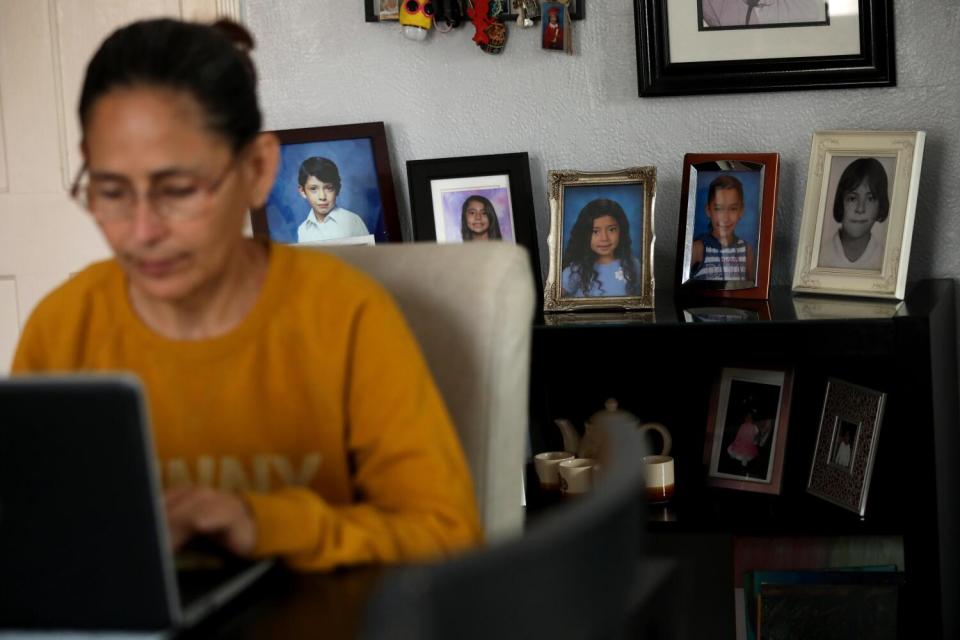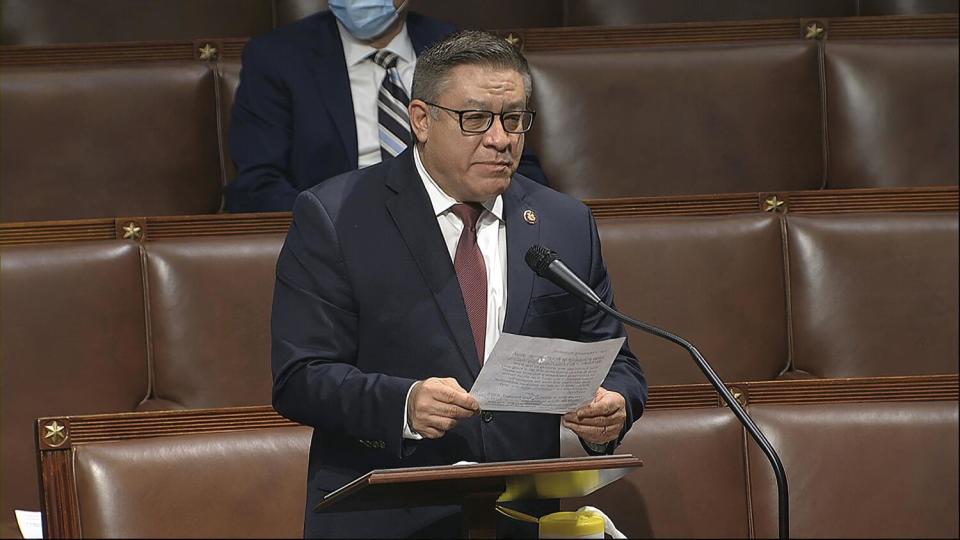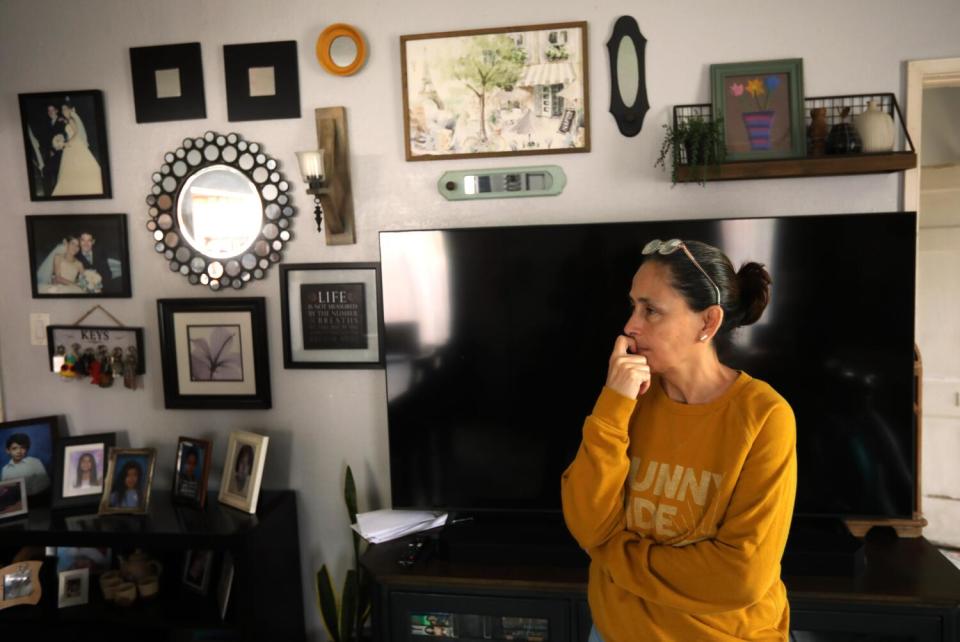Four years ago, Claudia Aleman and her family had only one way to go online: via their mobile phone. Without internet access on a computer, her youngest daughter couldn’t get her homework assignments in on time, her parents couldn’t keep up with online doctor visits, and the English classes she wanted to register for were out of reach.
Then came a change: The federal government began offering a subsidy to cover $30 of the family’s $80 monthly internet bill.
But when she opened the mail at her South Gate home two months ago, Aleman came across a letter from the Federal Communications Commission announcing that the Affordable Connectivity Program they had come to rely on would end in May unless Congress provided more funding. approve.

“My husband is the only one working, and everything is so expensive right now,” Aleman said. “Sometimes we don’t have thirty dollars left.”
“The program has made a significant difference in our lives,” she added. “Without this, life will be difficult, and I’m sure I’m not the only one who feels this way.”
The program, created after the pandemic forced many Americans to use the internet to connect to work and school, has 23 million enrollees nationwide — 1 in 6 U.S. households — including nearly 3 million in California.
Read more: Is your student still experiencing pandemic setbacks? A legal settlement by the state offers relief
Since 2021, it has provided a monthly subsidy of $30 for low-income households and $75 for households in tribal areas. But the $14.2 billion funded through the Infrastructure Investment and Jobs Act has run out.
April was the last month of full program benefits, but households could receive a partial rebate in May.
In a letter to Congress this month, FCC Chairman Jessica Rosenworcel warned that not funding the program would have a widespread impact, especially on seniors, veterans, schoolchildren and residents of rural and tribal communities.
“Households across the country are now faced with difficult choices about what costs they must cut, including food and gas, to maintain their broadband access, with some households questioning whether they can afford to maintain their broadband service at all,” wrote she.
Internet providers have their own programs for low-income households. People can enter their address into the FCC’s broadband map to find providers near them. The California Public Utilities Commission also provides a list of providers with low-cost internet plans.
But finding a cheaper alternative can be difficult. Rural households sometimes have only one provider, and families who cannot afford it have few options.
Rep. Salud Carbajal (D-Santa Barbara) is one of 228 bipartisan cosponsors of the Affordable Connectivity Program Expansion Act of 2024, which would provide an additional $7 billion to keep the program running for another year. The co-sponsors include 22 Republicans, including Rep. Young Kim (R-Anaheim Hills).
“You have to bury your head in the sand if you don’t understand the value of what this does to strengthen our economy and expand skills and opportunities for so many Americans,” Carbajal said. Allowing the program to expire, he said, “will undo the progress we have made in closing the digital divide.” It would take us back to the Dark Ages.’


But the bill has not yet been submitted for a standalone vote in the Republican Party-led House of Representatives, amid criticism from some Republicans who say the program subsidizes households that already have internet access. They also pointed to findings by the FCC’s internal watchdog last year that providers failed to follow program rules and improperly claimed money.
Last year, Senators John Thune (R-S.D.) and Ted Cruz (R-Texas) said in a statement that the program is “subject to massive waste, fraud and misuse of taxpayer dollars.”
In an FCC survey of 5,300 households conducted in December, more than two-thirds of respondents said they had inconsistent or no internet access before joining the federal program, with the majority citing affordability concerns. About a third of respondents said they had both mobile and home internet.
In October, the Biden administration sent Congress an additional $6 billion request to keep the program running, but that request was not passed.
Allowing the program to expire, even if it could be restarted later, would require additional spending on outreach and re-enrollment, Carbajal said. He also worries that people who benefit from it will get whiplash and lose confidence in the federal government.
Read more: More and more Californians are gaining access to broadband internet. But Black and Latino households are still lagging behind
California recently spent $70 million in federal funding on affordable internet services, devices and training. Carbajal said he’s glad his state is taking action, but that’s not enough.
“We can’t look at it from a parochial point of view,” he said. “I’m not just looking out for the Central Coast and my state – I’m looking out for the entire nation.”
Still, Carbajal said he is optimistic something will happen before May 1. Similar circumstances turned out favorably at the last minute, he said.
In Los Angeles, the federal program has played a major role in the county’s efforts to close the digital divide, which has been exacerbated by the COVID-19 pandemic. Local promotion grew enrollment in Los Angeles to nearly 1 million households.
County officials worked with the nonprofit EveryoneOn to bring attention to this. Chief Executive Norma Fernandez fears families will be confused as they see their internet bills rise and won’t understand why the program has ended.
“We’ve tried so hard and provided a lot of practical support to connect people, and then we’re going to pull it away from them,” she said. “It’s going to cause hopelessness.”


For Aleman’s family, the pandemic changed everything. When schools first closed, they relied on a Los Angeles County Unified School District program that offered free internet to eligible students.
But the service was unreliable: access regularly dropped out or crashed. So Aleman began leaving her daughter Miranda, now 11, with her sister and neighbors who had reliable internet access so she could take online classes and do her homework.
“I think my daughter lost an entire school year,” she said.
Their need for internet access at home has not changed since schools reopened. Most of Miranda’s assignments are still online.
Life improved almost immediately after they enrolled in the federal subsidy program in 2022 and gained internet access through AT&T. Miranda started turning in assignments on time. Aleman’s older daughters, 17 and 21, were able to do their schoolwork at home instead of in the library or at relatives’ homes.
It also made a difference for her parents. Her father, who is diabetic, takes online nutrition courses, and her mother, who is asthmatic, needs regular video checkups with her doctor. And Aleman was finally able to keep in regular contact with family in Mexico.
Since Aleman heard the program would end, she has applied for jobs to help her husband pay the bills. In May, her husband will pay the internet bill, possibly with credit cards.
Plus, she said, “there’s always the library.”
Get the LA Times Politics newsletter. Deeply reported insights into law, politics and policy from Sacramento, Washington and beyond, delivered to your inbox three times a week.
This story originally appeared in the Los Angeles Times.